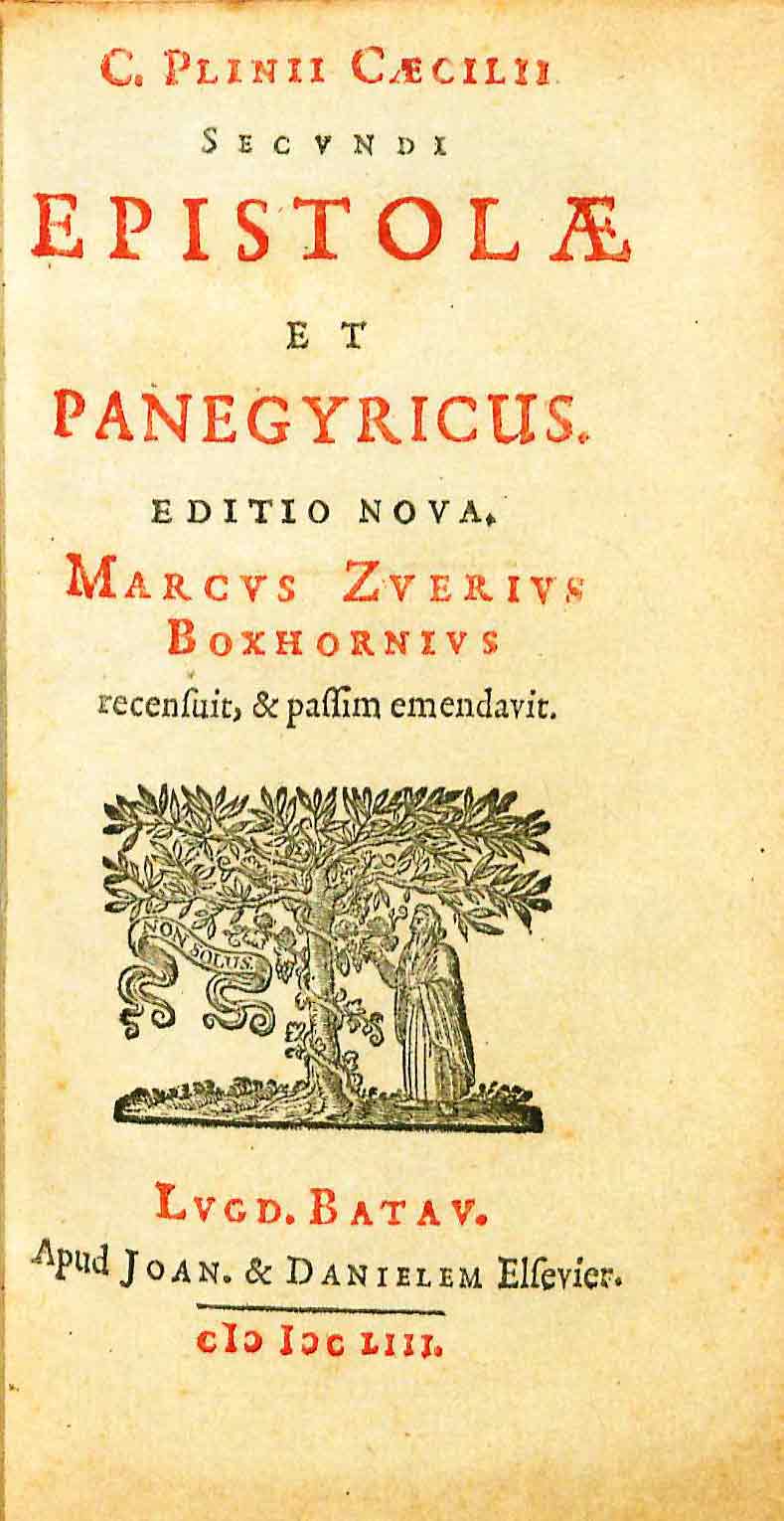Difference between revisions of "C. Plinii Cæcilii Secvndi Epistolæ et Panegyricus"
Lewarkentin (talk | contribs) |
Dbthompson (talk | contribs) (→Description of the Wolf Law Library's copy) |
||
| Line 27: | Line 27: | ||
Bound in full red leather with gilt lettering to spine. Includes the iscription "14HSO(?), Ex musoeo Alfred Villeford, 1850" on the front free endpaper.<br /> | Bound in full red leather with gilt lettering to spine. Includes the iscription "14HSO(?), Ex musoeo Alfred Villeford, 1850" on the front free endpaper.<br /> | ||
<br /> | <br /> | ||
| − | View the record for this book in [https://catalog.swem.wm.edu/law/Record/3621158 William & Mary's online catalog]. | + | Images of the library's copy of this book are [https://www.flickr.com/photos/wolflawlibrary/sets/72157659782580066 available on Flickr.] View the record for this book in [https://catalog.swem.wm.edu/law/Record/3621158 William & Mary's online catalog]. |
==See also== | ==See also== | ||
Revision as of 14:19, 14 October 2015
by Pliny the Younger
| C. Plinii Cæcilii Secvndi Epistolæ et Panegyricus. | |
|
Title page from C. Plinii Cæcilii Secvndi Epistolæ et Panegyricus., George Wythe Collection, Wolf Law Library, College of William & Mary. | |
| Author | Pliny the Younger |
| Editor | Marcus Zuerius Boxhorn |
| Published | Lvgd Batav.: Apud Joan. & Danielem Elsevier |
| Date | 1653 |
| Edition | Editio nova |
| Language | Latin |
| Pages | 12, 404, [28] |
| Desc. | 12mo (14 cm.) |
| Location | Shelf L-2 |
Gaius Plinius Caecilius Secundus, or Pliny the Younger (23-79 C.E.), was a Roman naturalist, encyclopedist, and writer.[1] The nephew and adopted son of Pliny the Elder, he became a senator and governor of Bythnia in c.112. He is noted for his nine books of private letters, which were published between 100–109. Pliny's letters are charming pieces on diverse literary, social, and domestic themes that intimately illustrate public and private life in the heyday of the Roman Empire.[2] He is best known for his correspondence with the Emperor Trajan, which provides a unique record of the life of a Roman gentleman and the treatment Christians during this era.[3]
Evidence for Inclusion in Wythe's Library
Listed in the Jefferson Inventory of Wythe's Library as Plinii epistolae. 12mo. This was one of the books kept by Thomas Jefferson. Jefferson later sold a copy of the 1653 edition of C. Plinii Cæcilii Secvndi Epistolæ et Panegyricus to the Library of Congress in 1815. It still exists but has no identifiable Wythe markings.[4] The Brown Bibliography[5] and George Wythe's Library[6] on LibraryThing include the 1653 edition, and the Wolf Law Library purchased a copy of the same edition.
Description of the Wolf Law Library's copy
Bound in full red leather with gilt lettering to spine. Includes the iscription "14HSO(?), Ex musoeo Alfred Villeford, 1850" on the front free endpaper.
Images of the library's copy of this book are available on Flickr. View the record for this book in William & Mary's online catalog.
See also
References
- ↑ The Macquarie Dictionary, s.v. "Pliny," accessed October 8, 2013.
- ↑ Britannica Concise Encyclopedia, s.v. "Pliny the Younger," accessed October 8, 2013.
- ↑ Philip's Encyclopedia, s.v. "Pliny (the Younger)," accessed October 8, 2013.
- ↑ E. Millicent Sowerby, Catalogue of the Library of Thomas Jefferson, 2nd ed. (Charlottesville: University Press of Virginia, 1983), 5:7 (no.4630).
- ↑ Bennie Brown, "The Library of George Wythe of Williamsburg and Richmond," (unpublished manuscript, May, 2012) Microsoft Word file. Earlier edition available at: https://digitalarchive.wm.edu/handle/10288/13433.
- ↑ LibraryThing, s.v. "Member: George Wythe," accessed October 8, 2013.



